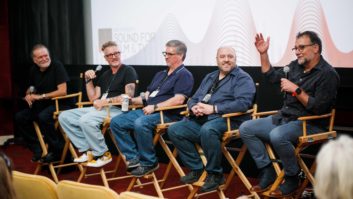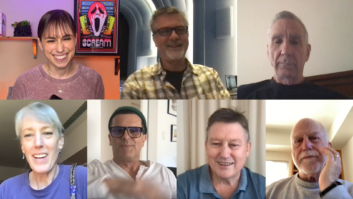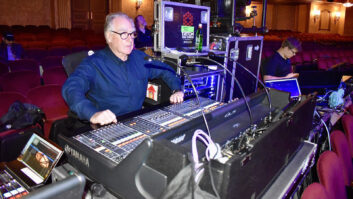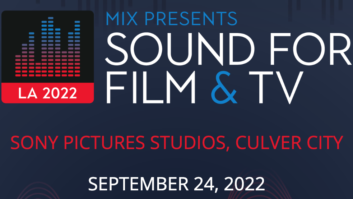
Los Angeles, CA (April 10, 2020)—For the past 11 years, Los Angeles-based four-piece Chicano Batman has had reviewers reaching for the hyphens in an attempt to describe the band’s vintage-R&B-soul-funk-psychedelic-Tropicália-lounge grooves. Invisible People, released May 1, puts a modern spin on the band’s sound, courtesy producer Leon Michels and mixer Shawn Everett, with edgy vocals layered over unidentifiable sounds—is that a guitar or a synth?—and super-tight and dry bass and drums.
The band initially worked with Michels on 2017’s Freedom is Free, their first release for ATO Records, the independent label founded by Dave Matthews. “That was a sonic boost for us. It was like we landed on a trampoline,” says lead vocalist Bardo Martinez, who also contributes keyboards and guitar, during a recent video shoot at Barefoot Recording in Hollywood.
Studio Showcase: Barefoot Recording Opens Up to the World
The band, its management and label came up with a list of producers for this follow-up album, but none seemed a good fit. “They were missing that edge, that funk, that we got with Leon,” says guitarist Carlos Arévalo. “So we said, what if we get Leon again?”
Everett’s name had also come up. “I was in love with that War on Drugs record [A Deeper Understanding, engineered and mixed by Everett]. So much detail and tone; it’s a masterpiece,” says Arévalo.
“He did The Voidz’ records,” adds Martinez, the solo venture by The Strokes’ frontman Julian Casablancas. “I was totally absorbed in those records, especially Julian’s vibe on them.”
But with Everett’s trophy shelf groaning under the weight of Grammys for his work with Alabama Shakes, War on Drugs and Kacey Musgraves, a collaboration seemed an impossible dream. Then Martinez ran into Britanny Howard of label-mates Alabama Shakes at the corner store. “Bardo called us later and said, ‘I can’t believe it, I was just in Shawn Everett’s studio with Britanny.’ That’s all we needed, was for someone to meet him,” says Arévalo.
“We said, lock him in before his rates go up!” laughs bassist Eduardo Arenas, who also plays guitar and sings with the band.
Michels, co-owner of Diamond Mine Recording in Long Island City, NY with several of the key musicians behind the sound of the Dunham and Daptone record labels, worked with the band on arrangements. “There was a lot of taking apart instrumental parts, taking them out because they didn’t necessarily serve the song,” says Martinez. “It was really about writing songs that had hooks and choruses.”
Some ground rules were established to keep things fresh: Don’t end every song with a major-seventh; start a song with a drum fill; bring the chorus in earlier. “We did a bunch of stuff we’d never done,” says Arenas, including ditching their signature vintage organ sound for a stack of synthesizers.
But where to record? Visiting some of Hollywood’s top studios, the band was disappointed to discover they all had the same outboard gear and consoles, and the tape machines were out of commission. Then Arévalo had lunch with Money Mark, of Beastie Boys fame, and asked him to recommend a studio that was neither too big nor too DIY.
“He’s my personal Yoda,” he says. “He said, ‘You’ve got to go to Barefoot; Eric Valentine just made it public.’ We came here and they had everything we like. It added a lot of vibe knowing that Sly Stone, George Clinton and Stevie Wonder made music here.”
“This place has stuff like an Ursa Major Space Station, Eventide Instant Phaser, UnFairchilds,” says Arenas. “We were home; this is what we aspire to.”
Everett was unable to engineer the record due to other commitments, so Michels brought in Diamond Mine’s chief engineer, Jens Jungkurth, an analog equipment designer for the likes of Purple Audio, NonLinear Audio and Eisen Audio. “He knows so much about recording. No plug-ins, analog only; a genius,” says Arévalo.
“Jens knows how to get drum and bass sounds,” adds Arenas. “It’s scientific.”
Chicano Batman has long tracked live. “Leon also comes from that world,” says Martinez. “He fell in love with Gabriel [Villa, Chicano Batman’s drummer]. He plays super light and super precise on the drums. There aren’t a lot of cats that can play like that.”
Before mixing began, Arenas recalls, “We chilled with Shawn for three different sessions, just listening to music we liked and listening to our demos. Shawn mixes in a little-ass room on NS10s. For as big of a sound as he gets, it’s the simplest thing.”
“It’s totally the opposite of what you would expect of somebody of that caliber,” says Martinez. “To me, as somebody who looks at the nut and bolts as secondary to the art of the music, it shows that no matter what angle you come at it, you can still make amazing music.”
The band let Everett loose on the Invisible People tracks. “I remember when we handed everything off to Shawn, he said, ‘Is there anything you don’t want me to touch?’ We just said, do your thing. And he reinvented our sound,” says Arévalo.
In an interview, Arévalo recalls, Everett once said it’s easier for him to mix a record when he didn’t engineer it. “Because when he engineers it, he knows that the guitarist spent hours trying to get that right amp, right speaker. It’s easier to be able to say, ‘I’m cutting that part,’ because he has no emotional attachment to it.
“And he cut a bunch of my guitars, and a bunch of Bardo’s guitars, too. I was trying to get Nile Rodgers’ tone in the studio; he crusted it up, put it through a SansAmp. But it’s what we wanted. It sounds darker, heavier, and it has more punch. He’s a genius.”
Previously, some bands members would worry that their recordings would be difficult to reproduce live without additional musicians. “With this new record, we weren’t going to let it limit us,” says Martinez. “It was about making these the best songs possible. Our goal as a band was to make the best record possible.”
Chicano Batman • www.chicanobatman.com






